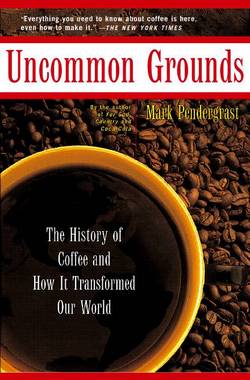(p. 263) In the middle of this fierce competition, with its low quality standards and apparent market saturation, a New York nut vendor and restaurateur proved that a new brand stressing quality could triumph.
. . .
Black understood the power of advertising. In radio spots, which blanketed the New York metropolitan airwaves, Black’s second wife, Jean Martin, sang a hummable jingle:
Chock full o’ Nuts is that heavenly coffee,
Heavenly coffee, heavenly coffee.
(p. 264) Chock full o’ Nuts is that heavenly coffee-
Better coffee Rockefeller’s money can’t buy.
By August 1954, less than a year after its debut, Chock full o’ Nuts had grabbed third place among vacuum-packed coffees in New York City.
Source:
Pendergrast, Mark. Uncommon Grounds: The History of Coffee and How It Transformed Our World. New York: Basic Books, 2000.
(Note: ellipsis added.)

